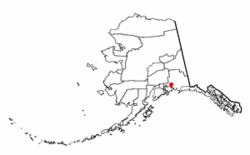Valdez, Alaska
| Valdez, Alaska | |
|---|---|
| City | |

Aerial view showing the townsite, the harbor, the lower Mineral Creek valley and Blueberry Hill.
|
|
| Nickname(s): Valdez | |
 Location of Valdez, Alaska |
|
| Coordinates: 61°7′51″N 146°20′54″W / 61.13083°N 146.34833°WCoordinates: 61°7′51″N 146°20′54″W / 61.13083°N 146.34833°W | |
| Country | United States |
| State | Alaska |
| Census Area | Valdez-Cordova |
| Incorporated | June 11, 1901 |
| Government | |
| • Mayor | Larry Beavers |
| • State senator | Mike Dunleavy (R) |
| • State rep. | George Rauscher (R) |
| Area | |
| • Total | 277.1 sq mi (717.6 km2) |
| • Land | 222.0 sq mi (574.9 km2) |
| • Water | 55.1 sq mi (142.7 km2) |
| Elevation | 98 ft (30 m) |
| Population (2010) | |
| • Total | 3,976 |
| • Density | 18.2/sq mi (7.0/km2) |
| Time zone | Alaska (AKST) (UTC-9) |
| • Summer (DST) | AKDT (UTC-8) |
| ZIP code | 99686 |
| Area code | 907 |
| FIPS code | 02-82200 |
| GNIS feature ID | 1412465 |
| Website | www.ci.valdez.ak.us |
Valdez /vælˈdiːz/,/vəlˈdɛz/ (Alutiiq: Suacit) is a city in Valdez-Cordova Census Area in the U.S. state of Alaska. According to the 2010 US Census, the population of the city is 3,976. The city was named in 1790 after the Spanish Navy Minister Antonio Valdés y Fernández Bazán. A former Gold Rush town, it is located at the head of a fjord on the eastern side of Prince William Sound. The port did not flourish until after the road link to Fairbanks was constructed in 1899. It suffered huge damage during an earthquake in 1964, and is located near the site of the disastrous 1989 Exxon Valdez oil tanker spill. Today it is one of the most important ports in Alaska, a commercial fishing port as well as a freight terminal.
The port of Valdez was named in 1790 by the Spanish explorer Salvador Fidalgo after the Spanish naval officer Antonio Valdés y Fernández Bazán. A scam to lure prospectors off the Klondike Gold Rush trail led to a town being developed there in 1898. Some steamship companies promoted the Valdez Glacier Trail as a better route for miners to reach the Klondike gold fields and discover new ones in the Copper River country of interior Alaska than that from Skagway. The prospectors who believed the promotion found that they had been deceived. The glacier trail was twice as long and steep as reported, and many men died attempting the crossing, in part by contracting scurvy during the long cold winter without adequate supplies. The town did not flourish until after the construction of the Richardson Highway in 1899, which connected Valdez and Fairbanks. With a new road and its ice-free port, Valdez became permanently established as the first overland supply route into the interior of Alaska. The highway was open in summer-only until 1950, when it was operated as a year-round route.
...
Wikipedia
